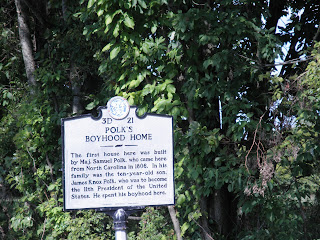I realized after my last couple of posts, someone could get the impression that I had a miserable time in The South. Nothing could be further from the truth. I had a great time and found many things to like and love about the places I went. So, for the sake of accuracy, I have compiled a list of things I enjoyed about The South.
1. Friendliness
Having grown up in an area of Pennsylvania where the locals can most charitably be described as reticent, I appreciated the general atmosphere of friendliness in The South. People were helpful and sweet and willing to just have a nice chat with a stranger.
2. Their accents
As I stated in my previous post, I have always wanted to say "y'all" naturally. I seriously envy those who can.
3. Barbeque
I love barbeque. I also have no idea what the difference between good barbeque and bad barbeque is. Trying to find restaurants, people would tell me the barbeque someplace was decent, but when I ate there, it would taste amazing. Because of this, I ate more barbeque in a five day period than I usually do in six months.
4. Fireworks stores
Fireworks are illegal in Pennsylvania, but vendors in Pennsylvania can sell fireworks to people in New Jersey, even though fireworks are also illegal in New Jersey (ah, the beauty of a country of laws). I say this to make it clear I have seen fireworks warehouses before. I have bought fireworks in a fireworks warehouse before.
If you love fireworks (and if you don't, you really don't know what you're missing), go south. I saw more billboards and stores related to fireworks in five days in the south than the rest of my life put together. Not only was there a heavy concentration, each place was big, usually about the size of a small airplane hangar. My excitement never dwindled with each sighting, so now about 10% of our pictures from the trip are of fireworks warehouses.
5. The insane concentration of historical markers
Anyone who has read this blog has probably figured out that I'm a massive history nerd. When I see a historical marker, I get excited. I soon learned being a history lover in the South was like being wine lover in Napa. In Charles City, Virginia I saw four markers within ten feet of each other. The sight was so overwhelming, I almost swooned, or at least let out an undignified squeal of excitement.
6. The opportunity to finally experience song geography
As a music lover and college radio DJ, I love me a theme playlist. My southern tour gave me my best opportunity yet to indulge in my propensity for geographically themed songs. Carolina in My Mind, Sweet Home Alabama, The Night They Drove Old Dixie Down (both versions!), and basically every Pretty Girl song were all played at some point. However, my proudest accomplishment was the realization that there is a geographical error in the song Wagon Wheel by Old Crow Medicine Show: Johnson City is actually to the east of the Cumberland Gap.
1. Friendliness
Having grown up in an area of Pennsylvania where the locals can most charitably be described as reticent, I appreciated the general atmosphere of friendliness in The South. People were helpful and sweet and willing to just have a nice chat with a stranger.
 |
| Even the mules are friendly in the South. |
As I stated in my previous post, I have always wanted to say "y'all" naturally. I seriously envy those who can.
3. Barbeque
I love barbeque. I also have no idea what the difference between good barbeque and bad barbeque is. Trying to find restaurants, people would tell me the barbeque someplace was decent, but when I ate there, it would taste amazing. Because of this, I ate more barbeque in a five day period than I usually do in six months.
4. Fireworks stores
Fireworks are illegal in Pennsylvania, but vendors in Pennsylvania can sell fireworks to people in New Jersey, even though fireworks are also illegal in New Jersey (ah, the beauty of a country of laws). I say this to make it clear I have seen fireworks warehouses before. I have bought fireworks in a fireworks warehouse before.
If you love fireworks (and if you don't, you really don't know what you're missing), go south. I saw more billboards and stores related to fireworks in five days in the south than the rest of my life put together. Not only was there a heavy concentration, each place was big, usually about the size of a small airplane hangar. My excitement never dwindled with each sighting, so now about 10% of our pictures from the trip are of fireworks warehouses.
 |
| Sadly, none of those pictures were actually good. |
Anyone who has read this blog has probably figured out that I'm a massive history nerd. When I see a historical marker, I get excited. I soon learned being a history lover in the South was like being wine lover in Napa. In Charles City, Virginia I saw four markers within ten feet of each other. The sight was so overwhelming, I almost swooned, or at least let out an undignified squeal of excitement.
 |
| I was almost run over in the process of getting this picture. It was worth it. |






